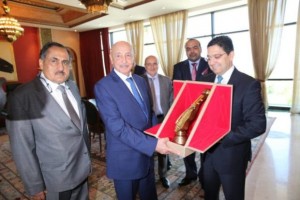Asharq Al-Awsat
Ageela Saleh, accompanied by Libyan ambassador Abdulmajed Seif El Nasr (left), presented by Moroccan foreign minister Nasser Bourita with a trophy to mark his visit (Photo: Herald of Libya)
President of the Libyan House of Representatives Ageela Saleh Issa reaffirmed on Tuesday commitment towards Libya’s political agreement, signed on 17 December 2015 in Skhirat, however after the amendment of a few terms.
Saleh Issa said that after amendments are made the accord will be incorporated into the country’s constitution, recognizing the Government of National Accord’s (GNA) presidential council.
Speaking at a press conference held on Monday after Saleh Issa said that the Libyan parliament requested the amendment of the Skhirat agreement. The presser was held on the sidelines of bilateral discussions held between Saleh Issa and Moroccan Foreign Minister Nasser Bourita in Rabat.
The presidential council must be composed of a single president and two deputies, Saleh Issa said. He also mentioned that the acting prime minister must have power over council assignment, in addition to other points.
For his part, Moroccan FM Bourita called on all Libyan parties to accept the principle of consensus. It was in the interests of the Libyan people, their peace, and the country’s unity, the minister said.
Morocco hosted the UN-brokered Libya Dialogue sessions in Skhirat which resulted in the Libyan Political Agreement. Saleh Issa, however, is not wholly in agreement with it.
Since March 2016, the conflict between the two rival governments, the Libyan House of Representatives and the GNA-affiliated General National Congress (GNC), has intensified. Despite previously supporting it, the Libyan House of Representatives withdrew its recognition of the GNA by voting against it in the summer of 2016 and becoming their rival for governing the country.
More so, Bourita said that his country’s interest lies in sustaining Libya’s stability and unity given the long-standing relations shared between the two countries.
He stressed that Rabat will continue its mediation efforts with all Libyan parties in hopes of bringing conflicting parties closer together.
Bourita pointed out that Saleh Issa’s visit to Rabat comes within the framework of many efforts made by Morocco under orders from King Mohammed VI concerning the Libyan file, aiming to establish a political consensus between the Libyans.
For his part, Saleh Issa said that talks with Bourita intensely reviewed the situation in Libya and directed help to Libyan people, as well as provided substantial aid for counterterrorism efforts.








